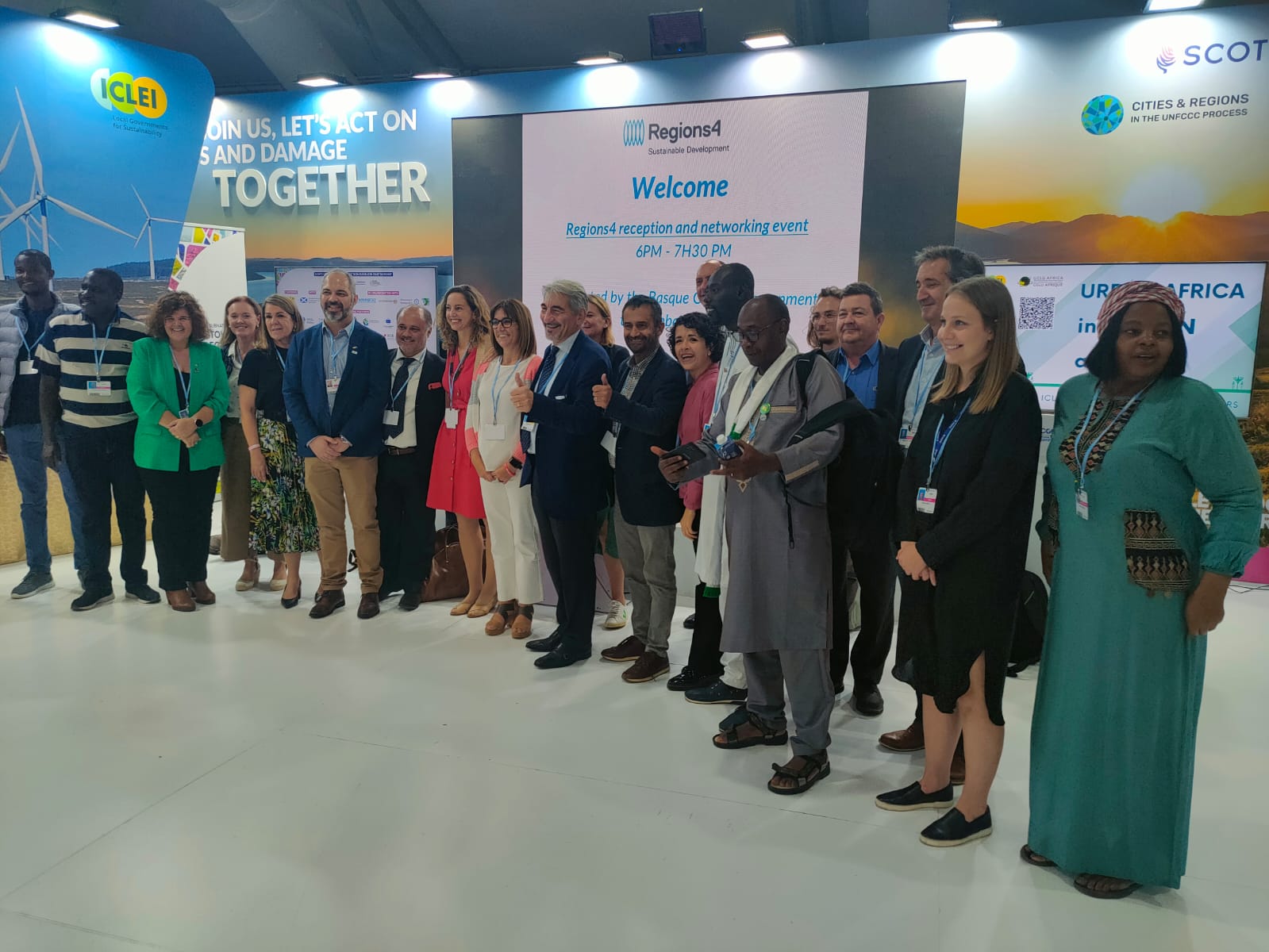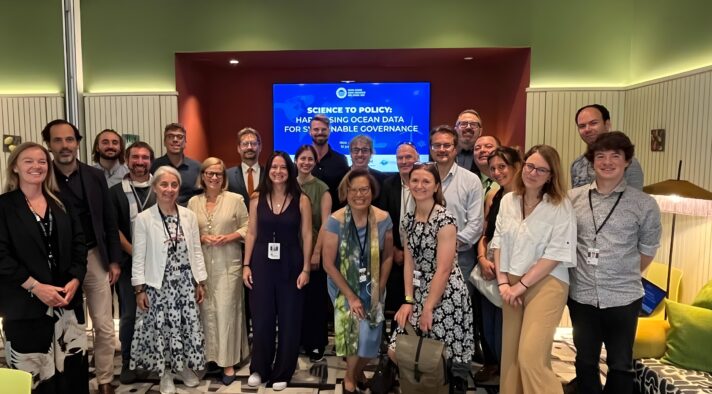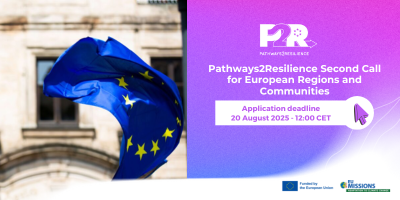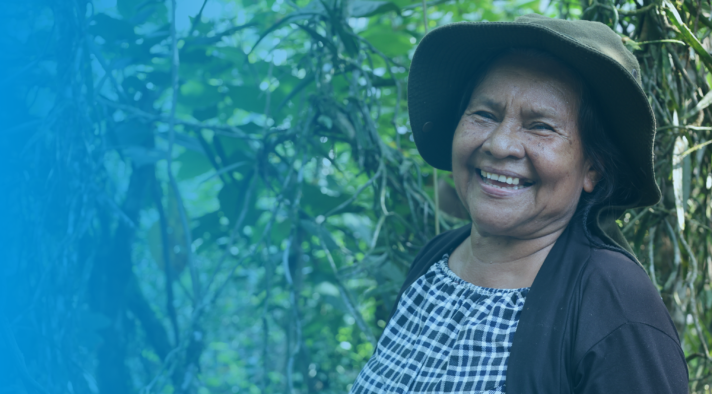At a COP27, defined by a dramatic interplay between hope and hindrance, subnational governments have reinforced their role as key actors in the implementation of innovative and desperately needed solutions
‘Localization is the new globalization’. A phrase echoed during COP27 in Egypt, by a broad range of constituents gathered to face the ongoing challenge of how to effectively implement the main tenants of the Paris Agreement on the ground. Regions4, the global network of regional governments for ambitious action on climate, biodiversity, and sustainable development, brought together a delegation of 25 regional governments, who gathered in Sharm El Sheikh over the two weeks at COP, with the objective of demonstrating their clear and significant contributions to the global effort and defining the key role of regional governments in delivering the Paris Agreement goals.
A central focus of COP27 was on implementation and developing regions. The Local Governments and Municipal Authorities (LGMA) constituency, which formally represents subnational governments before the UNFCCC, and of which Regions4 is an active member, was out in full force, with over 500 representatives, and 150 governors, mayors, regional leaders, harnessing the voices of its global delegation, and made visible at its very own pavilion dedicated to a wide range of issues throughout the conference.
As defined by the Egyptian COP27 presidency, adaptation and development were prominent issues, and the role of regional governments and local actors in delivering on adaptation was made inherently clear.
Regions4 in full force at COP27 through political leadership and engagement with the UNFCCC process
Regions4 presented the Declaration of Rabat Salé Kénitra Regions for a Resilient Future: driving transformative action for the planet, people and prosperity’, signed by 48 regional governments and partners. This political statement includes key messages and commitments, and called on national governments and climate finance institutions, amongst others, to:
- Reinforce the formal recognition of the role of subnational governments in the fight against climate change, by formally recognizing Regionally and Locally Determined Contributions as complementary to the Nationally Determined Contributions (NDCs) and National Adaptation Plans (NAPs), and by including the climate commitments, actions and achievements of subnational governments in the national inventory reports presented by the parties as part of the Paris Agreement Enhanced Transparency Framework.
- Systematically step-up efforts to enact effective multilevel climate governance, and allow for formal, functional, and long-term mechanisms of coordination with national governments towards the implementation of the Paris Agreement at regional and local levels.
- Require climate finance organizations and institutions to provide credible objectives and to deploy means of implementation in developing countries that allow for dedicated financing at regional and local levels, through subnational climate funds or allocations.

#Multilevelaction delivers: Historic visibility and engagement of regional governments with the UNFCCC process
Regions4 had its largest-ever delegation at a COP and was able to contribute directly to the negotiations around the Global Goal on Adaptation, having participated in the 3rd Workshop on ‘Methodologies, indicators, data and metrics, monitoring and evaluation, and the second Technical Dialogue of the Global Stocktake, held at COP27 among partners, experts, and non-party stakeholders to assess progress on the Climate Paris Agreement.
Regions4 plays a vital role in taking stock of the progress of regional governments on adaptation, as an official partner and platform of the Race to Resilience campaign through which regional governments commit to ambitious objectives and action on adaptation. To highlight the significant advances that have been made over the past 2 years, the RegionsAdapt Progress Report 2021–2022 was launched during a high-level event at the LGMA pavilion at COP27, on the COP27 Resilience Day.
The event, which included the participation of 7 different regional ministers and secretaries, the COP27 High-Level Champion, Nigel Topping, the CEO of the European Climate Foundation, Laurence Tubiana, and Regions4 Secretary General, Natalia Uribe, highlighted the 322 actions taken by 32 regions from 16 different countries around the world, demonstrating clear leadership by regions on mainstreaming adaptation, developing clear adaptation plans and enacting climate legislation, and the importance of reporting on the increasing socio-economic risks associated with climate change impacts.
The impressive engagement of regions and the LGMA constituency led to the inclusion of cities and multilevel governance as key elements in the Sharm El Sheikh implementation plan and in the decisions of the Glasgow-Sharm El-Sheikh Work programme for the global goal on adaptation.
Launch of key initiatives to support local and regional governments
The Marrakesh Partnership for Global Climate Action is led by the High-Level Climate Champions and is constituted by non-party stakeholders, in which Regions4 is also an active member, as RegionsAdapt represents the voice of regional governments in the Race to Resilience campaign. COP27 saw the launch of key MPGCA initiatives, such as the Adaptation Agenda, and increased visibility and engagement of non-party stakeholders.
- The Sharm-El-Sheikh Adaptation Agenda outlines 30 Adaptation outcomes to enhance resilience for 4 billion people living in the most climate-vulnerable communities by 2030. Regions4 contributed to shaping the outcome target of the Adaptation Agenda: 100 regional governments will implement actionable adaptation plans by the 2030 target, based on CDP 2021 reporting data, and will support its members, with partners of the Race to Resilience, to achieve this common goal. Each outcome presents global solutions that can be adopted at a local level to protect vulnerable communities from drought, flooding, or extreme weather.
- Locally and regionally led adaptation solutions: The Marrakesh Partnership played also a key role in highlighting the growing actions and solutions from all stakeholders presented through their Resilience Hub, and ‘Implementation Labs’, in which Regions4 contributed through targeted interventions from the Council of Governors of Kenya (implementation lab on subnational finance) and the State of Jalisco in Mexico (implementation lab on actionable adaptation plans). For more information on Regions4 members, best practices consult here.
Other relevant initiatives include:
- Finance for adaptation at the local and regional level: a number of interesting initiatives were launched to support subnational governments and local communities. For example, the African Cities Water Adaptation Fund (ACWA Fund) provides new funding to African cities and regions to tackle the water crisis.
- The Government of Quebec announced financial aid to help developing countries fight the climate crisis, including renewing their contribution to the Adaptation Fund, partnering with FAO to support projects on Strengthening Agriculture Adaptation, and announced the first Mobilization Strategy for Climate Action 2022-2027 in Quebec.
- Loss and damage, was a priority issue at COP27, and subnational governments expressed growing concerns over the social, economic, and environmental impacts of climate change on their territories notably in developing regions. The loss and damage fund is perhaps the most important and high-profile result of COP27. However, subnational governments also made significant contributions and announcements in this area. Regional governments such as Wallonia, and most notably the government of Scotland have been working since COP26 in Glasgow to make the case and better understanding how to define solutions for loss and damage.
- At COP27, the government of Scotland launched the report ‘Addressing Loss and Damage: Practical Action’, and pledged £5 million for loss and damage at the Multilevel Action Pavilion, through their Climate Justice Fund.
- Sustainable urbanization: The first ever Urbanisation and Climate Ministerial bringing together ministers and mayors, and regional governments to discuss the key challenges facing cities was organized at COP on November 17th, Solutions Day. In addition, the COP27 Presidency launched the Sustainable Urban Resilience for the Next Generation (SURGe) initiative, which aims to build on the commitments of cities and provide a holistic framework to achieve sustainable and resilient urban systems.
- Agriculture and Nature-based Solutions: Nature-based Solutions (NbS), agriculture and forest management, have been included for the first time in a COP cover decision. The inclusion of NbS within a COP decisions text is something many organisations, including Regions4, have been working towards for many years. This significant milestone will grant parties oversight to ensure NbS are not misused for greenwashing, violating human rights, or harming biodiversity. The multilaterally agreed NbS definition adoption by the UNEA and the USA NbS roadmap released during COP27 were likely two major decisive factors in achieving the inclusion of NbS in the final decision text.
- Specifically, the Sharm el-Sheikh Implementation Plan resulting from COP27 includes the term nature-based solutions within a dedicated section on forests with the launch of the Forest and Climate Leaders’ Partnership, which aims to unite action by governments, businesses, and community leaders to halt forest loss and land degradation by 2030.
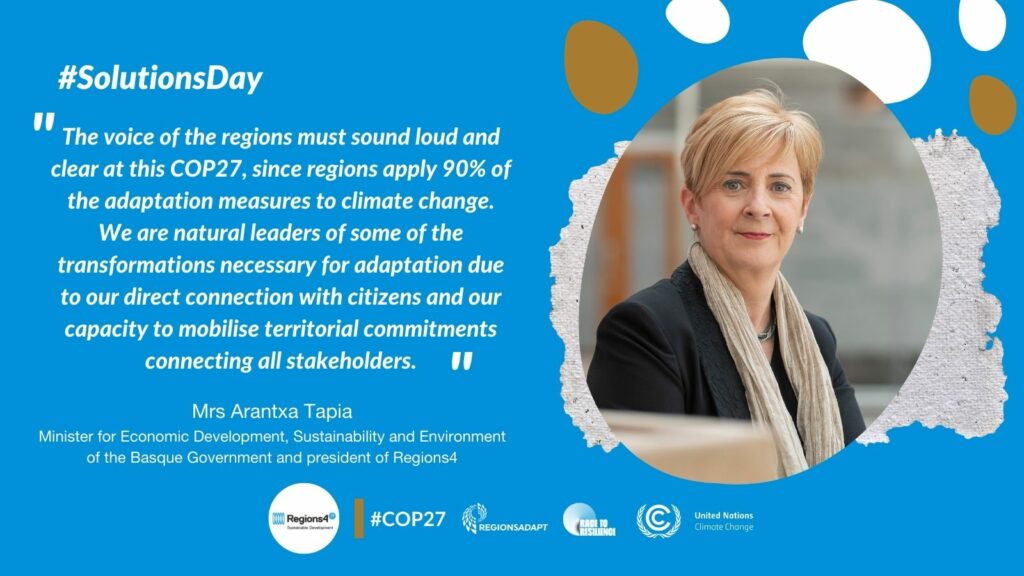
Adaptation financing gaps remain a significant challenge at the regional and local level
Despite the significant progress and important initiatives announced, crucial gaps remain, notably around financing for adaptation and access to financing by subnational and local actors. The US$100 billion annual target, promised initially by 2020, has not been met. The new finance goal has been delayed to next year, along with a status report on the commitment to double adaptation finance by 2025.
An in-depth analysis by the UN Environment Programme (UNEP) warns that the amount for adaptation finance flowing to developing countries is currently five to 10 times lower than what is needed. This is even less when looking at the actual redistribution to regional and local governments, which struggle to tap into climate finance, in part due to the lack of capacity to build bankable projects adapted to the requirements of such funds.
As the RegionsAdapt Progress Report 2021 – 2022 highlights, there is an ‘adaptation gap’ between developed and developing regions. Most developed regions are already implementing their second cycle of adaptation plans, developing robust legal frameworks, and financial instruments. On the other hand, developing regions still lack funding and implementation capacity, despite being the most vulnerable to and affected by climate change. Making sure that these regions have access to the opportunities and initiatives launched at COP, including seed funding made available to respond to opportunities and build bankable projects, will be one of the top priorities for all partners of the Race to Resilience.
In the fight for finance, cities appear to be better positioned, and benefit from higher attention and support from the financial community to develop actionable adaptation plans. Regional governments, on the other hand, will need to connect further with city-related initiatives and build on new means of support, in order to accelerate action. Drawing on the need to tackle adaptation from a regional perspective that bridges the urban-rural divide, allowing for a larger scope, scale and reach of nature-based solutions, regions must make the case regarding the need for adaptation initiatives that cross municipal boundaries.
Regions4 actions towards a resilient future
COP27 has made some progress in showing concrete solutions, notably to move towards a more resilient future. If we want to achieve a resilient future, we must understand that climate action and biodiversity conservation are two key and interrelated aspects that must necessarily be addressed on a subnational scale. That is why we will also attend the UN Convention on Biological Diversity Conference of the Parties (COP15) on 7 – 19 December 2022 in Montreal, to bridge the divide between climate and biodiversity issues. We encourage you to work with us and join us at COP15 in representing the voice of regions as essential actors in forging the post-2020 Global Biodiversity Framework.
Engage with Regions4’s activities at COP15: consult our dedicated website: Regions4 at COP15 and follow us on Twitter and LinkedIn.
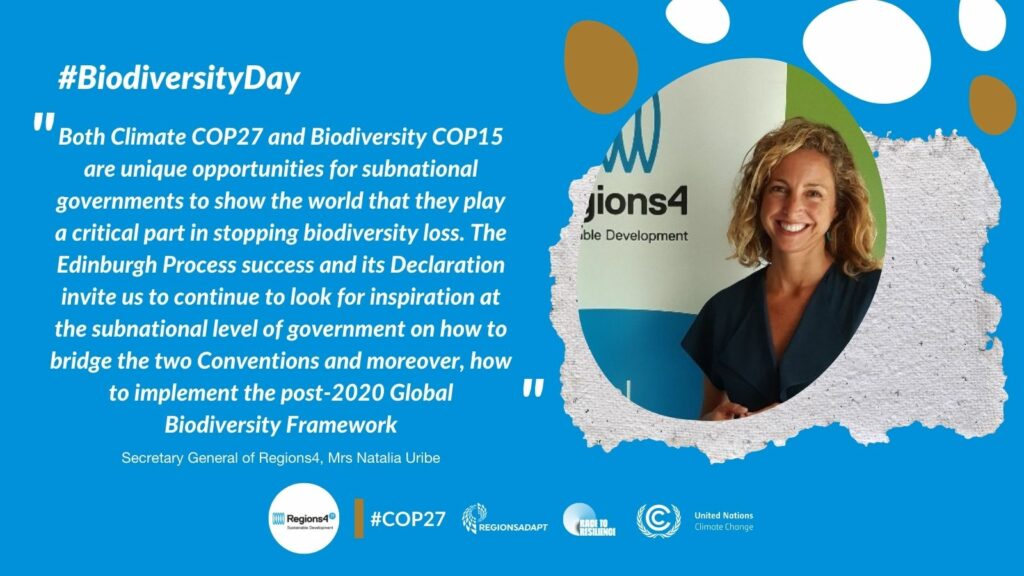
Further information
- Consult the declaration of regional governments for COP27
- Consult the RegionsAdapt progress report 2021 – 2022
- Consult the joint press release for COP27
- Consult Regions4 COP27 webpage
- Consult Regions4 COP27 Outcome Activity Report
- Consult Regions4 Regional Best Practices
